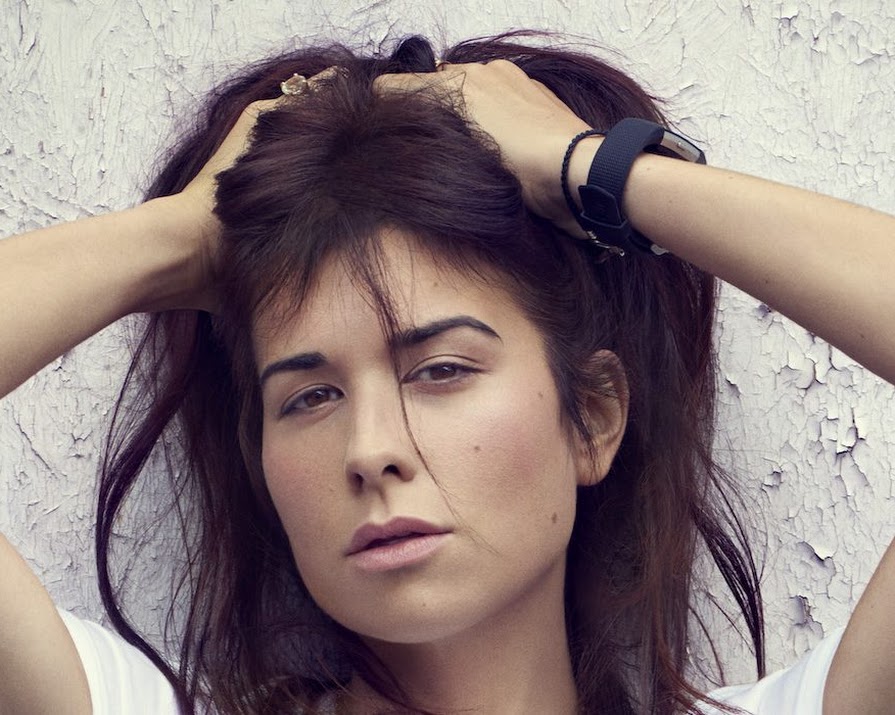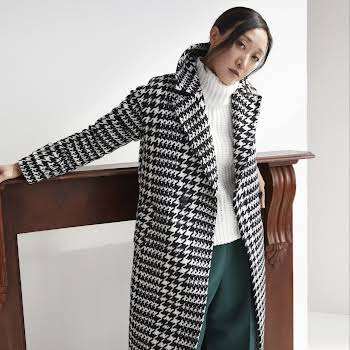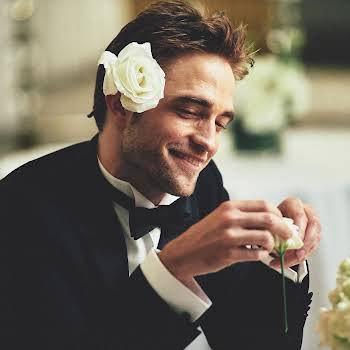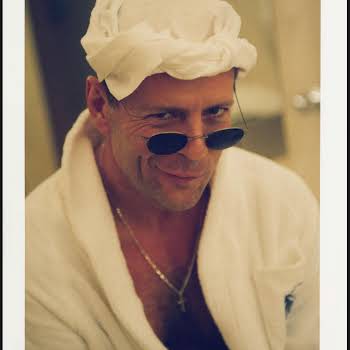By Jessie Collins
28th Feb 2018
28th Feb 2018
Mallow-born Stefanie Preissner is a writer in demand. With a book, TV show, and film all in the works, she has provided a new voice for women that is both fresh and funny. She talks work ethics, inspiration and body confidence with JESSIE COLLINS.
For some reason, I had all sorts of concerns in advance of our shoot with Stefanie Preissner – that she would be slightly in pain throughout the process. ( the opposite turned out to be true.) And there was another dynamic at play. Preissner is the kind of person you really want to do a great job for – her combination of raw talent, originality, creativity, and wit means she already has a play, a book, two TV shows, a pilot for Channel 4 and a film in the works, all at the young age of 29.
It shows a drive that is rarely combined with such ability. “But,” she admits, “ambition is one of the worst things you can be struck down with. Have I pushed happiness on to the horizon of success? If you’d asked me last year ‘What would make you really happy?’ I would have replied, The Late Late Show and Can’t Cope… Season 2.’ I have both of those things now, so if you ask me again, it will be, ‘Yeah, what’s next?’ And that sort of ambition can be a poisoned chalice.”
Preissner’s breakthrough piece, Solpadeine is My Boyfriend, a monologue play that became a runaway success at the Dublin Fringe Festival in 2012, led to RTE taking a rare punt and commissioning her to write an original series. Can’t Cope, Won’t Cope aired late last year to widespread praise. A sharply written comedy-drama, it put Preissner front and centre as a new talent to be reckoned with. It was quickly snapped up by BBC3, ( and is currently being shown on Netflix), and led to Preissner becoming a writer in demand.
Which leads us to her current show, airing on RTE Player right now, to great acclaim. How to Adult is a brilliant six-parter of ten-minute vignettes on everything from mortgages and buying a car to fitness and sexual health. “The reaction has been amazing. Loads of people have responded, saying, ‘I didn’t know this, and this is so timely and great’, and there have been a couple of people who’ve told me I’m capitalising on Millennials who don’t know how to iron their clothes. I think that’s sort of despicable, because at any age if someone goes in search of information [then] that is a noble endeavour and [they] should never be shamed. I was not taught this stuff in school, it was not on the curriculum.”
“When I was growing up,” she continues, “the adults in my life were hugely burdened by negative equity, by NAMA, and we kind of had to raise ourselves. I just wanted to put the information into bite-size chunks. It’s not ‘I have all of the information and I’ve got my sh*t together’; it’s as I learn, hopefully, you might learn.” It was a reaction too to the amount of conflicting information there is out there. “If I enter ‘I’’ve a headache’ into a search engine, all of a sudden I am dying of fibromyalgia; the internet is a double-edged sword. We now live in a gig economy. I don’t know how much I’m going to earn next month. To get a pension, to qualify for a mortgage – they haven’t adapted the system. There is nothing in place to protect us.
Perhaps unsurprisingly, given this is Ireland, there has been a particularly big reaction to the sexual health episode, something she felt really uncomfortable talking about, but that she knew was important to tackle head-on. “I remember being so shocked when I had my period that it wasn’t blue water. What the hell is this? Am I going to get eaten by a shark if I go into the sea?” There is a brilliant scene in which she’s discussing STIs at a sexual health clinic, and learns for the first time that some of them can be cancerous. “All my childhood and the nuns were telling me that sex was a sin. If they’d have said, ‘Don’t have sex, you’ll get cancer’, I would have been far less likely to go ahead and lose my virginity. I also feel like in this country, we have such a history of shame, silence, taboo and such a lack of respect for women’s bodies and [not] giving them the information, which is the baseline. I’ve had enough of that.”
Does she have a good relationship with her own body? “I’ve always been kind of fit and looked after myself. I trained as an actor and you have to be really fit for that. I did Solpadeine is My Boyfriend, where I dragged a beanbag around after me, but I didn’t really care what I was eating. I wasn’t aware. I had absolutely no idea.” A decision to give up sugar and alcohol several years ago meant a dramatic change in her body shape, but she says, it was more about taking a holistic attitude to her health. She kick-boxes to keep fit but is careful not to go down the road of cliched, “Yes I am happy now I am thinner” shtick.
I am a writer, that’s my job. My body is nothing to do with it, yet continually I am asked about it, or I’m asked to do photographs, but I am viewed through a different lens than a male writer.”
The whole area of body confidence she describes as a “treacherous road. I don’t know anyone who would stand up and say, ‘I am totally happy with my body’. They post photos to Instagram that would suggest they are, but when you meet them in person, that’s often not the case. If you were just looking at Instagram, you’d think everyone was in the best nick of their lives. Everyone’s at the gym, everyone’s got biceps, I’ve seen them all. But the metrics are telling us that we are more obese than ever, we have a health crisis. This echo chamber of Instagram makes it seem like everyone is doing the right thing, but they are not. On the other hand, there is the fat-shaming culture. We have a responsibility to not dictate to women how their bodies should look, but also there is something to be said for not blurring the lines between ‘I’m happy with my body’ and ‘I’m being complacent about my health’ in terms of being over- and underweight.”
Here she raises an important point too. “People are not fat, they have fat, and it is a transient thing. You have hair, you are not your hair. [And] the gender thing on this is unbelievable. I wonder if the discussion around body-confidence can tend to perpetuate that. I am a writer, that’s my job. My body is nothing to do with it, yet continually I am asked about it, or I’m asked to do photographs, but I am viewed through a different lens than a male writer.”
There are male writers in her agency, she says, that have never been asked to be photographed or dressed, or asked what they are wearing to an event, or had the suggestion made to them that they should wear something else. “I believe in empowering women, and there are lots of ways to do that. My way is to get up at 4.30am and write radical female characters that women get to play, and women get to see. That’s my way of shifting the status quo.” She continues: “I am much more confident than I was, though at the time I probably appeared more confident. I feel more confident when my legs are shaved, I feel more confident when my underarms are shaved, and I should be allowed to say that. I certainly think that I stand a little taller coming out of the gym because I feel I am doing something good for myself. Because my body, and my relationship with it, is going to be the longest thing I have in my life.”
Born in Mallow to an Irish mum and a German dad, she was surrounded by strong female role models, particularly her mum and granny, and still takes inspiration from strong women, though not necessarily from the most likely of places. The Garda Commissioner Nóirín O’Sullivan is a hero (she initially wanted to be a Garda) and in a time of crisis, she often texts her flatmate, “WWNOD?” (short for What Would Nóirín O’Sullivan Do?) “It’s easy for people to compare me to those strong female writers, and I’m constantly compared to Lena (Dunham), but I don’t see myself as my career. I had to break the news to my friend that her bike had been stolen from outside my house, and I was like, ‘How would Bryan Dobson break this news?’ I love Katie Taylor. I think she is a brilliant ambassador for women. And she is ferocious and has so brilliantly dealt with the ups and downs, and with integrity. I love how her faith is just so strong and she doesn’t seem to give a damn what people think.”
Born in Mallow to an Irish mum and a German dad, she was surrounded by strong female role models, particularly her mum and granny, and still takes inspiration from strong women, though not necessarily from the most likely of places.
Despite being in the middle of writing season two of Can’t Cope, Won’t Cope, while on the second draft of a film script, as well as a comedy-drama pilot with Channel 4, she has also managed to finish her first book, Why Can’t Everything Stay the Same? (And Other Things I Shout When I Can’t Cope), out in October. “When I was at school, I had no respect for adjectives. I always thought because my writing wasn’t flowery enough, and I didn’t know what bucolic meant, that I couldn’t be a writer. I use simple language, I don’t look up the dictionary, so I’m kind of really proud of myself.”
The book is part memoir, part observational comedy and deals with everything from friendship to heartbreak to grief. She explains: “Each chapter will start with a bit about my life, like a break-up, and then go into the macro – that same social commentary voice I’ve developed from writing Can’t Cope, Won’t Cope.” She is careful, though, not to overshare. “I write at the start that I have this ongoing argument with my mother about how much I made from my Communion. She swears it’s one figure, I say it’s another. That’s sort of a caveat that not all my memories are exact, so take a massive pinch of salt, sit back, and read this. I’ve changed the names of people, and then there are some stories I thought about entering. I have very few people that are in a close relationship with me, and they are desperately important to me. I don’t think anyone who is friends with me should have their lives impacted even a smidge because they are related to me and I’m in the public eye.”
That doesn’t stop her from tackling taboos, but she is not going to make her life always the focus. “I am very open about things that I feel need to be talked about in general in Ireland, but I would never exploit those closest to me for entertainment. Even my social media is very curated, but I am not going to be sharing when I’m having a cappuccino. I’m happy to share stuff about breakups because when you break up, it’s sort of like a division of assets; you get your narrative back. But I would never talk about people without their consent. You do have to be careful.”
“If something is done from an honest place, if it comes from a good place, nothing really bad happens. That’s what I’m told anyway.”
Much to her delight, the introduction to the book has been written by Nell Scovell, the creator of Sabrina the Teenage Witch, a show that, she says, was such an influence on her young life, and she is hoping Nóirín O’Sullivan will launch it. Given her incredible work ethic (up and writing at 4am, and frequently in bed by 8pm), as well as her introverted nature, time-out involves watching back-to-back episodes of The Chase or Elaine with her granny or cooking dinner with her mum when she’s up from Cork. Given she is naturally private and careful of what she shares, the book and further success are sure to test that. Is she nervous about putting more of herself out there? “If something is done from an honest place, if it comes from a good place, nothing really bad happens. That’s what I’m told anyway.”
This article is taken from our July 2017 issue.
 If you would like to hear more of Stefanie’s story, alongside Nikki Lannen, founder, and CEO of Warbucks and Roisin Lafferty, founder and managing director of Kingston Lafferty Design, then join IMAGE contributing editor, Melanie Morris for our second Young Businesswomen’s Forum of the year on Tuesday, March 27th at the Westbury Hotel, Dublin. Enjoy an evening of insight, inspiration and lots of luxury as we hear from three incredible women on their success journeys to working in three fascinating fields.
If you would like to hear more of Stefanie’s story, alongside Nikki Lannen, founder, and CEO of Warbucks and Roisin Lafferty, founder and managing director of Kingston Lafferty Design, then join IMAGE contributing editor, Melanie Morris for our second Young Businesswomen’s Forum of the year on Tuesday, March 27th at the Westbury Hotel, Dublin. Enjoy an evening of insight, inspiration and lots of luxury as we hear from three incredible women on their success journeys to working in three fascinating fields.
When Tuesday, March 27, 6 pm
Where The Westbury Hotel, Dublin
Tickets€45*
*Includes Luxury Seat Gift























